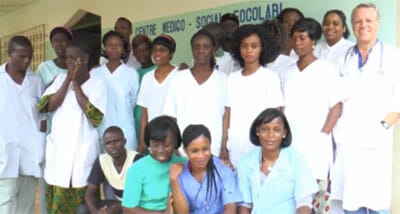
Oct 12, 2015 | Focolare Worldwide
 «During these years I think I alone visited 50,000 patients,» says Dr. A. Carlo Montaguti, a focolarino doctor and Director of the Social Medical Centre of the little Focolare town in Man, Ivory Coast. «I was a doctor in my country, Italy, but my practice was not so intense. Those who preceded me when there was still the war, told me before my departure: Carlo, if you don’t treat them, no one else will.» The patients arrived also in the night. The health records were compiled in the apatam (shed) in front of the hospital, and then they entered for the medical checkup by any of the three doctors of the centre, one of which is Muslim. The doctors prescribed the lab tests and got the results in about two hours. In a second visit, the diagnosis was done and the treatment prescribed. In the span of a morning one manages to get everything done. «It is not usual to have a lab for analysis in such a small centre in the suburbs,» Carlo continues; «I worked for four years without a lab and it was really difficult.» Luc Dro, head of the laboratory, explained that being in a tropical zone, there is great need for studies on parasites that cause malaria and other endemic diseases, but the lab is able to perform a complete check-up. The centre also has a small pharmacy, where over a 100,000 consultations were registered. «We do all that is possible to put the patients at the core of our work – says Dr. Alavo Bazini – and this explains the great influx. It does not suffice to say “the medicines are free of charge,” if the people are not satisfied. This is where the centre’s originality lies.» When possible, there is also a cultural mediator who translates into the local tongues. «We also have the internet and wi-fi connection – explained Dr. Eliassa Sow – In this way we can do research work and cooperate with other doctors from afar.» Dr. Montaguti continues «I came in 2004 – when the centre consisted of two tiny rooms for visits and one for medications. The people have appreciated our work especially because during the war in 2002, in the most difficult moments when all the foreigners were leaving the country, we decided to stay on, and risk our lives. They understood that we were there for them and this generated their trust. At times it came about that on a Monday, after the weekend break, the patients said: ”Doctor, I tried to endure in order to come to you.” If their situation was not too serious, they preferred to wait another day and suffer a bit more, to be able to come here!» One of the strong points of the centre is also the healthcare team which is involved in the entire care process. When the political-military crisis ended and the situation in the region calmed down, the term of the centre was extended and in 2008 we moved into a new facility. «It seemed like a dream – Carlo recalls – but after two years with the influx of patients – more than 80 a day plus their relatives – quite a crowd! – the old structure could not take any more. And we continued to dream.» And so last 10 October, the new Focolare Social Medical Centre, opened last 7 September, was inaugurated in Man, a stone’s throw from Mariapolis Victoria. It is a modern architecture for a facility of over 1,000 sq. m, with the addition of new services: 15 beds, a dentist’s studio, a physiotherapy room, and new diagnostics equipment (ultrasound scans, hemoglobin electrophoresis and microbiology). In the last days the nutrition centre, previously located in the district of Libreville, was completed and transferred to cure infantile malnutrition..
«During these years I think I alone visited 50,000 patients,» says Dr. A. Carlo Montaguti, a focolarino doctor and Director of the Social Medical Centre of the little Focolare town in Man, Ivory Coast. «I was a doctor in my country, Italy, but my practice was not so intense. Those who preceded me when there was still the war, told me before my departure: Carlo, if you don’t treat them, no one else will.» The patients arrived also in the night. The health records were compiled in the apatam (shed) in front of the hospital, and then they entered for the medical checkup by any of the three doctors of the centre, one of which is Muslim. The doctors prescribed the lab tests and got the results in about two hours. In a second visit, the diagnosis was done and the treatment prescribed. In the span of a morning one manages to get everything done. «It is not usual to have a lab for analysis in such a small centre in the suburbs,» Carlo continues; «I worked for four years without a lab and it was really difficult.» Luc Dro, head of the laboratory, explained that being in a tropical zone, there is great need for studies on parasites that cause malaria and other endemic diseases, but the lab is able to perform a complete check-up. The centre also has a small pharmacy, where over a 100,000 consultations were registered. «We do all that is possible to put the patients at the core of our work – says Dr. Alavo Bazini – and this explains the great influx. It does not suffice to say “the medicines are free of charge,” if the people are not satisfied. This is where the centre’s originality lies.» When possible, there is also a cultural mediator who translates into the local tongues. «We also have the internet and wi-fi connection – explained Dr. Eliassa Sow – In this way we can do research work and cooperate with other doctors from afar.» Dr. Montaguti continues «I came in 2004 – when the centre consisted of two tiny rooms for visits and one for medications. The people have appreciated our work especially because during the war in 2002, in the most difficult moments when all the foreigners were leaving the country, we decided to stay on, and risk our lives. They understood that we were there for them and this generated their trust. At times it came about that on a Monday, after the weekend break, the patients said: ”Doctor, I tried to endure in order to come to you.” If their situation was not too serious, they preferred to wait another day and suffer a bit more, to be able to come here!» One of the strong points of the centre is also the healthcare team which is involved in the entire care process. When the political-military crisis ended and the situation in the region calmed down, the term of the centre was extended and in 2008 we moved into a new facility. «It seemed like a dream – Carlo recalls – but after two years with the influx of patients – more than 80 a day plus their relatives – quite a crowd! – the old structure could not take any more. And we continued to dream.» And so last 10 October, the new Focolare Social Medical Centre, opened last 7 September, was inaugurated in Man, a stone’s throw from Mariapolis Victoria. It is a modern architecture for a facility of over 1,000 sq. m, with the addition of new services: 15 beds, a dentist’s studio, a physiotherapy room, and new diagnostics equipment (ultrasound scans, hemoglobin electrophoresis and microbiology). In the last days the nutrition centre, previously located in the district of Libreville, was completed and transferred to cure infantile malnutrition..
Video presentation of the Medical Centre (in French) https://vimeo.com/141902777
![Chiara Lubich: Daring to dream of a new era]()
Oct 10, 2015 | Non categorizzato
 “If one day all people, not as individuals but as nations, learn to put themselves aside, to put aside the idea they have about their own country, … and if they were to do this as the expression of the mutual love between States that God wants, just as he wants mutual love among individuals, that day will mark the beginning of a new era. For on that day, Jesus will be alive and present among peoples. … Now is the time for every people to go beyond its own borders, to look farther. Now is the time to love other countries as our own, to acquire a new purity of vision. To be Christians it is not enough to be detached from ourselves. The times we live in ask something more of the followers of Christ: the awareness of Christianity’s social dimension. … … We hope that the Lord may have mercy on this divided and confused world, on peoples closed within their own shells, contemplating their own beauty – so special to them – although it is limited and unsatisfying. With clenched teeth they hang on to their own treasures, those very treasures that could help other peoples, where many are dying of hunger. May the Lord cause the barriers to fall, and charity to flow unhindered between one land and another, in an endless stream of spiritual and material goods. Let us hope that the Lord brings about a new order in the world. Only he can make humanity one family and cultivate the distinctive characteristics of each people, so that the splendour of each, placed at the service of others, may shine with the one light of life. By making each earthly country beautiful, this light will make each one a foretaste of the eternal Country”. Chiara Lubich
“If one day all people, not as individuals but as nations, learn to put themselves aside, to put aside the idea they have about their own country, … and if they were to do this as the expression of the mutual love between States that God wants, just as he wants mutual love among individuals, that day will mark the beginning of a new era. For on that day, Jesus will be alive and present among peoples. … Now is the time for every people to go beyond its own borders, to look farther. Now is the time to love other countries as our own, to acquire a new purity of vision. To be Christians it is not enough to be detached from ourselves. The times we live in ask something more of the followers of Christ: the awareness of Christianity’s social dimension. … … We hope that the Lord may have mercy on this divided and confused world, on peoples closed within their own shells, contemplating their own beauty – so special to them – although it is limited and unsatisfying. With clenched teeth they hang on to their own treasures, those very treasures that could help other peoples, where many are dying of hunger. May the Lord cause the barriers to fall, and charity to flow unhindered between one land and another, in an endless stream of spiritual and material goods. Let us hope that the Lord brings about a new order in the world. Only he can make humanity one family and cultivate the distinctive characteristics of each people, so that the splendour of each, placed at the service of others, may shine with the one light of life. By making each earthly country beautiful, this light will make each one a foretaste of the eternal Country”. Chiara Lubich
Excerpt from “Mary, bond of unity among nations”, Summer 1959 – Published in “Essential Writings”, New City Press, New York, 2007. pp. 231-2
Oct 9, 2015 | Focolare Worldwide
“Dear Synod Fathers, dear brothers and sisters, In resuming this morning the work of the General Congregation, I invite you to dedicate the prayer of the Third Hour to the intention of reconciliation and peace in the Middle East. We are painfully struck and we follow with great concern what is happening in Syria, in Iraq, in Jerusalem and the West Bank, where we see an escalation of violence that involves innocent civilians and continues to fuel a humanitarian crisis of enormous proportions. War brings destruction and multiplies the sufferings of peoples. Hope and progress come only from choices for peace. Let us unite, therefore, in an intense and confident prayer to the Lord, a prayer that intends to be an expression of solidarity at once with [our] brother Patriarchs and Bishops from those regions, who are present here [at the Synod Assembly], as well as with their priests and faithful, and to everyone who lives there. At the same time, together with the [whole] Synod, I send a heartfelt appeal to the international community, that the nations of the world might find a way effectively to help the parties concerned to broaden their horizons beyond the immediate interests and to use the instruments of international law [and] diplomacy, to resolve the conflicts underway at present. Finally, I wish to extend our prayer also to those areas of the African continent, which are experiencing analogous situations of conflict. May Mary, Queen of Peace and loving Mother of her children intercede for all”. (from Vatican Radio)
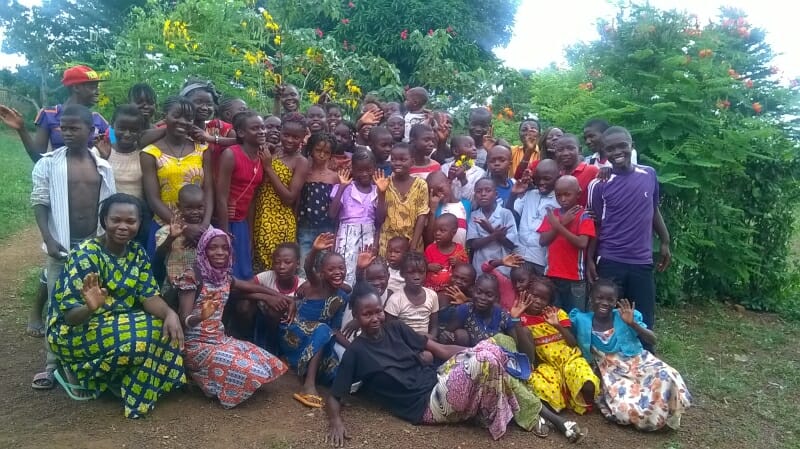
Oct 9, 2015 | Focolare Worldwide
 It is difficult to know the numbers – Misna sources report 60 dead with 300 wounded – and describe the events in a country that has been sinking in political crisis since March 2013 when a group of rebels overthrew the president; and there have been further outbreak in recent days. “The socio-political situation has worsened,” writes Geneviève Sanzé from the Central African Republic. “Christian families live between the house and the forest, so that they won’t be discovered at home and lose their lives. One priest, who lives in the north where the situation is quite serious, is offering shelter to 12,000 refugees in his parish, who are taking refuge from projectiles that are being launched all around them. He doesn’t know how he will care and find food for them. There is no more adminstrative , political or military authority in the region, and there is the constant danger of bombs in crowded areas.” From the Focolare of Bangui they write: “We were preparing to do something concrete to help promote the peace that our country is so much in need of: a sport competition with mixed teams of Christians and Muslims; a march for reconcilliation comprised of all sorts of ethnic and religious groups; a concert by several musical groups, including our own to help sway public opinion towards the need for peace; continuing visits to refugees here in Bangui and in the prison. We invited our Muslim friends and friends from different Christian churches to take part in organising these and other events, and they enthusiastically accepted.” “The first event had been planned for the 26th of September, but was not held because of a massacre that taken place here in Bangui on that day,” recounts Berndadine who works at the Nunciature. “It all began with the discovery of the lifeless body of a young Muslim woman in a Christian area. But the murderer and the circumstances surrounding the death are still unknown. In the span of a few hours non-Muslim homes were attacked, and many people were killed.” Death is everywhere, looting, destruction of houses, churches, schools, offices of international organisations and many displaced persons, including several from the Focolare community. Some have lost close relatives. They write: “We encourage each other to love, each one of us wherever we are, ready to die for our own people. Pray with us, for us and for everyone living in similar situations.” The city has seemed dead for days. “You didn’t go to work,” wrote Bernardine. “The shops were closed, the only vehicles on the street were those of the United Nations and the French Military. The population organised a protest calling everyone to civil disobedience, demanding the restoration of the national military to protect the people. More people died during the manifestation and everything stopped. Things have improved a bit in recent days, we’ve resumed some of our activities, although schools are still closed. We’re in God’s hands and we always believe in His love. Sooner or later there will even be peace in the Central African Republic.” And this hope is supported by the upcoming visit of the Pope in late November. Fidelia, from the focolare in Bangui, recounts: “The entire population, regardless of ethnic or religious group, joyfully awaits his coming. You can feel it in the air, that the people are expecting him as the bearer of hope. Everyone is preparing spiritually and materially in order to be disposed to welcome the graces that Pope Francis’s visit will bring.”
It is difficult to know the numbers – Misna sources report 60 dead with 300 wounded – and describe the events in a country that has been sinking in political crisis since March 2013 when a group of rebels overthrew the president; and there have been further outbreak in recent days. “The socio-political situation has worsened,” writes Geneviève Sanzé from the Central African Republic. “Christian families live between the house and the forest, so that they won’t be discovered at home and lose their lives. One priest, who lives in the north where the situation is quite serious, is offering shelter to 12,000 refugees in his parish, who are taking refuge from projectiles that are being launched all around them. He doesn’t know how he will care and find food for them. There is no more adminstrative , political or military authority in the region, and there is the constant danger of bombs in crowded areas.” From the Focolare of Bangui they write: “We were preparing to do something concrete to help promote the peace that our country is so much in need of: a sport competition with mixed teams of Christians and Muslims; a march for reconcilliation comprised of all sorts of ethnic and religious groups; a concert by several musical groups, including our own to help sway public opinion towards the need for peace; continuing visits to refugees here in Bangui and in the prison. We invited our Muslim friends and friends from different Christian churches to take part in organising these and other events, and they enthusiastically accepted.” “The first event had been planned for the 26th of September, but was not held because of a massacre that taken place here in Bangui on that day,” recounts Berndadine who works at the Nunciature. “It all began with the discovery of the lifeless body of a young Muslim woman in a Christian area. But the murderer and the circumstances surrounding the death are still unknown. In the span of a few hours non-Muslim homes were attacked, and many people were killed.” Death is everywhere, looting, destruction of houses, churches, schools, offices of international organisations and many displaced persons, including several from the Focolare community. Some have lost close relatives. They write: “We encourage each other to love, each one of us wherever we are, ready to die for our own people. Pray with us, for us and for everyone living in similar situations.” The city has seemed dead for days. “You didn’t go to work,” wrote Bernardine. “The shops were closed, the only vehicles on the street were those of the United Nations and the French Military. The population organised a protest calling everyone to civil disobedience, demanding the restoration of the national military to protect the people. More people died during the manifestation and everything stopped. Things have improved a bit in recent days, we’ve resumed some of our activities, although schools are still closed. We’re in God’s hands and we always believe in His love. Sooner or later there will even be peace in the Central African Republic.” And this hope is supported by the upcoming visit of the Pope in late November. Fidelia, from the focolare in Bangui, recounts: “The entire population, regardless of ethnic or religious group, joyfully awaits his coming. You can feel it in the air, that the people are expecting him as the bearer of hope. Everyone is preparing spiritually and materially in order to be disposed to welcome the graces that Pope Francis’s visit will bring.”
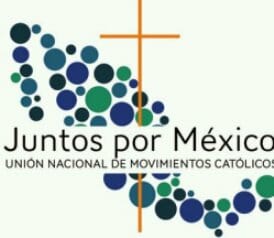
Oct 8, 2015 | Non categorizzato
 JUNTOS POR MEXICO (Together for Mexico) is a venue for meetings and mutual respect in order to facilitate joint actions for the spiritual and social good of the country. The event will have a festive but also reflective nature, with formation and education dedicated to the whole family. More than 10,000 people are expected to attend, and will reflect on the theme of the family and the role of the lay person in society according to different perspectives: anthropological, spiritual, social, and political. One of the most anticipated and important topics is the vision of young people. On the list of international speakers are Dr. Giovanni Impagliazzo (Italy), Coordinator for Latin America of the Community of Sant’Egidio; Mr. Ricardo Sada L.C., the local director of Regnum Christi; Dr. Maria Consuelo Queremel, the Vice Minister General of the Secular Franciscan Order. Speaking for the Focolare Movement are the co-president, Dr. Jesús Morán (Spain) and spouses Anna and Alberto Friso (Italy), members of the Pontifical Council for the Family. Also present will be Margaret Karram (Israel) and Marc St-Hilaire (Canada), who are responsible for the dialogue with other ecclesial movements. The event will be transmitted in streaming at www.juntospormexico.org.mx
JUNTOS POR MEXICO (Together for Mexico) is a venue for meetings and mutual respect in order to facilitate joint actions for the spiritual and social good of the country. The event will have a festive but also reflective nature, with formation and education dedicated to the whole family. More than 10,000 people are expected to attend, and will reflect on the theme of the family and the role of the lay person in society according to different perspectives: anthropological, spiritual, social, and political. One of the most anticipated and important topics is the vision of young people. On the list of international speakers are Dr. Giovanni Impagliazzo (Italy), Coordinator for Latin America of the Community of Sant’Egidio; Mr. Ricardo Sada L.C., the local director of Regnum Christi; Dr. Maria Consuelo Queremel, the Vice Minister General of the Secular Franciscan Order. Speaking for the Focolare Movement are the co-president, Dr. Jesús Morán (Spain) and spouses Anna and Alberto Friso (Italy), members of the Pontifical Council for the Family. Also present will be Margaret Karram (Israel) and Marc St-Hilaire (Canada), who are responsible for the dialogue with other ecclesial movements. The event will be transmitted in streaming at www.juntospormexico.org.mx
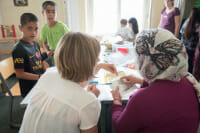
Oct 8, 2015 | Non categorizzato
 Germany has repeatedly made it in the headlines due to its controversial policies regarding refugees, that stirred up a reaction of the people in welcoming the many migrants who have arrived. Also the Focolare Movement in Germany has been working for many years now for the integration of immigrants into the social context, and intensifying its welcoming initiatives in this period. Starting from the most basic needs – such as the collection of food, clothing, furniture and other basic items, German lessons and looking for medical or legal aid – to that of a man in Aschaffenburg, define “a counter attack.” In some cities there were also some violent episodes against the refugees and those who were helping them, but there was the firm decision to respond by giving a counter-testimonial, a message which came through forcefully. The Focolare of Dresda organized in this perspective, a soiree on the theme, “Love your neighbour as yourself.” One of the organizers said “we see how many live in anxiety or even fear: the soiree was very useful, and encouraged many people to undertake actions together.” In addition to this, there was also a social media campaign, #openyourborders and #signupforpeace, launched at international levels by the Youth for United World, together with the aim of giving a further boost to the initiatives of the United World Project. But there are also concrete examples of daily life, like that of a couple from Munich, Bayern. The evening before their departure for a weekend excursion outside the city, they received a phone call asking for their willingness to host for the weekend, a young Syrian mother with three small children, while waiting to continue her journey to Karlsruhe. Though they hoped that the four would leave soon so they could at least spend a part of the weekend in the mountains, the couple – despite their internal conflict – accepted; but “the moment we took the hand of our little five-year-old princess, the ice was immediately broken,” they wrote. The weekend with the unexpected guests passed with the games played with the children, sharing their breakfast where “we renounced hotdogs out of respect for our Muslim guests who highly appreciated the yoghurt and flatbread we bought for them,” and a Syrian supper prepared together. And when we had to say goodbye on Sunday morning, “we all had tears in our eyes, and were happy and mutually grateful” – wrote the couple. What a gift the Divine director of this unexpected programme had in store for us!” Read this on www.fokolar-bewegung.de Herberge gefunden! Flüchtlinge: Stärkeres Engagement gefragt
Germany has repeatedly made it in the headlines due to its controversial policies regarding refugees, that stirred up a reaction of the people in welcoming the many migrants who have arrived. Also the Focolare Movement in Germany has been working for many years now for the integration of immigrants into the social context, and intensifying its welcoming initiatives in this period. Starting from the most basic needs – such as the collection of food, clothing, furniture and other basic items, German lessons and looking for medical or legal aid – to that of a man in Aschaffenburg, define “a counter attack.” In some cities there were also some violent episodes against the refugees and those who were helping them, but there was the firm decision to respond by giving a counter-testimonial, a message which came through forcefully. The Focolare of Dresda organized in this perspective, a soiree on the theme, “Love your neighbour as yourself.” One of the organizers said “we see how many live in anxiety or even fear: the soiree was very useful, and encouraged many people to undertake actions together.” In addition to this, there was also a social media campaign, #openyourborders and #signupforpeace, launched at international levels by the Youth for United World, together with the aim of giving a further boost to the initiatives of the United World Project. But there are also concrete examples of daily life, like that of a couple from Munich, Bayern. The evening before their departure for a weekend excursion outside the city, they received a phone call asking for their willingness to host for the weekend, a young Syrian mother with three small children, while waiting to continue her journey to Karlsruhe. Though they hoped that the four would leave soon so they could at least spend a part of the weekend in the mountains, the couple – despite their internal conflict – accepted; but “the moment we took the hand of our little five-year-old princess, the ice was immediately broken,” they wrote. The weekend with the unexpected guests passed with the games played with the children, sharing their breakfast where “we renounced hotdogs out of respect for our Muslim guests who highly appreciated the yoghurt and flatbread we bought for them,” and a Syrian supper prepared together. And when we had to say goodbye on Sunday morning, “we all had tears in our eyes, and were happy and mutually grateful” – wrote the couple. What a gift the Divine director of this unexpected programme had in store for us!” Read this on www.fokolar-bewegung.de Herberge gefunden! Flüchtlinge: Stärkeres Engagement gefragt
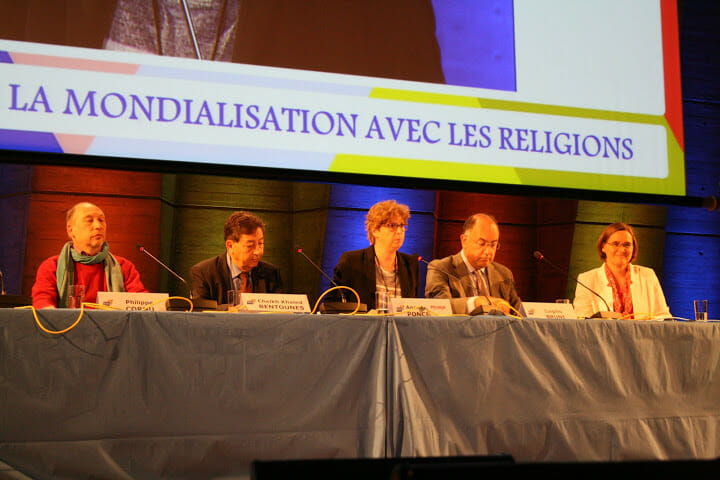
Oct 7, 2015 | Focolare Worldwide
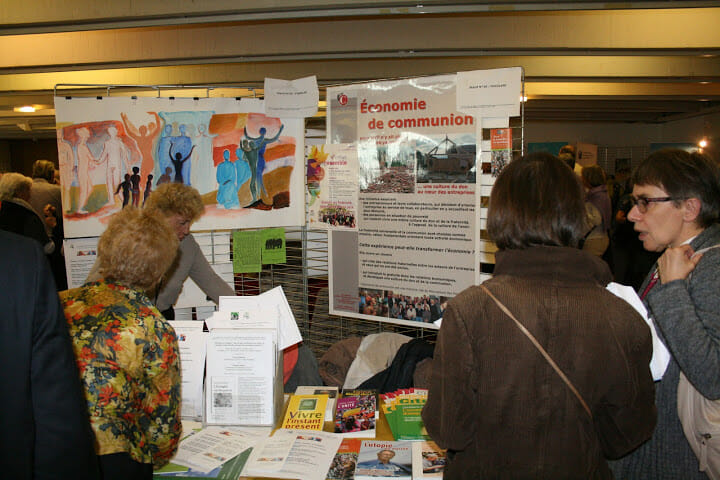
© Focolari-Alain Boudre
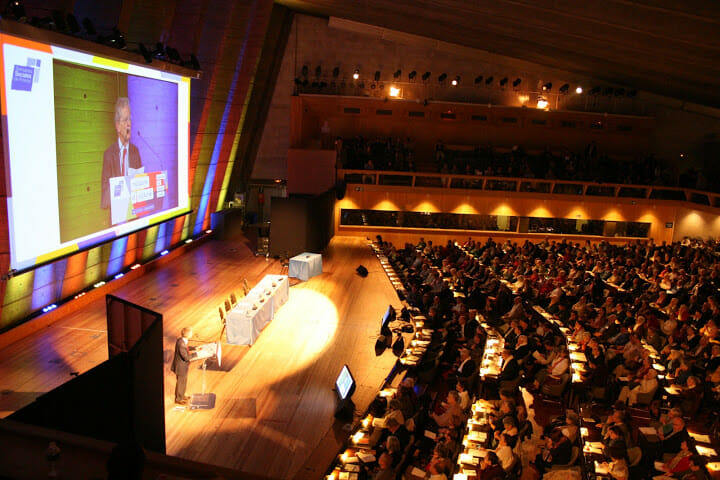
© Focolari-Alain Boudre

© Focolari-Alain Boudre
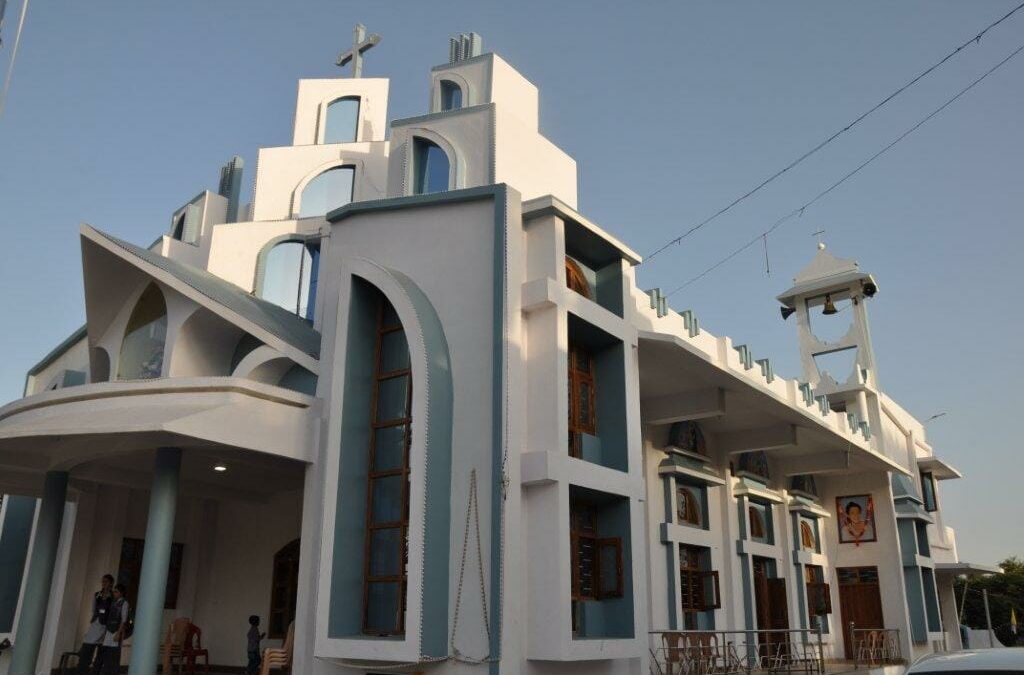
Oct 7, 2015 | Focolare Worldwide
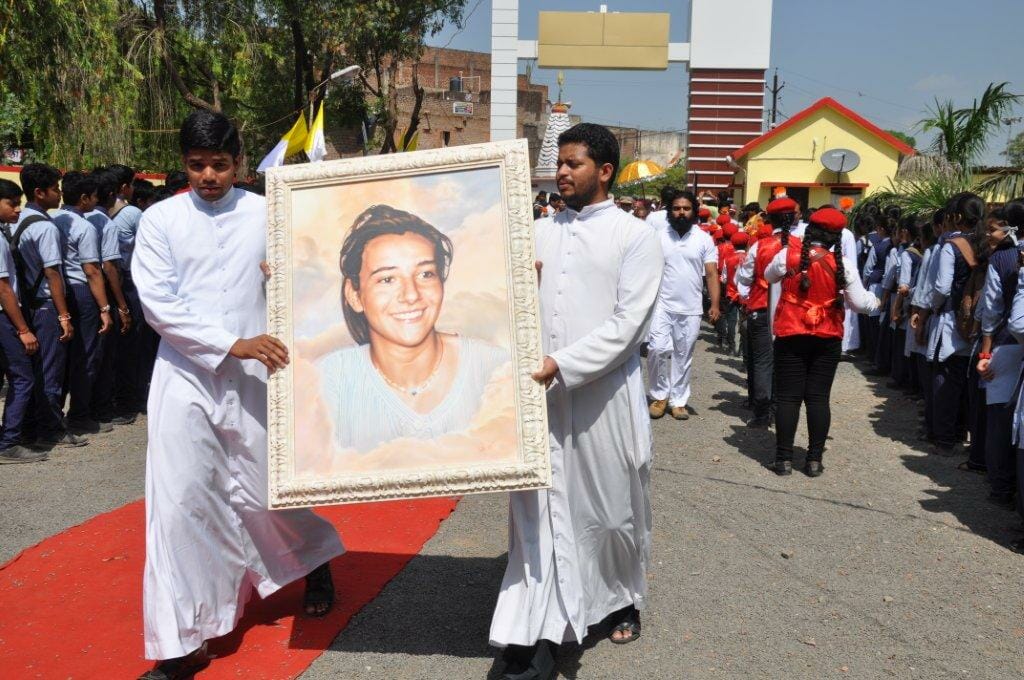 Msgr. Anthony Chirayath, bishop of the Syro-Malabar diocese of Sagar, consecrated the new church in the presence of the parents of Chiara Luce Badano, saying it was “an inspiration to all students in the country”. The couple arrived from Italy for the occasion at the invitation of the bishop. Many faithful and young students of local high schools, as well as groups of adherents to the Focolare Movement from Mumbai and Delhi, attended the ceremony.
Msgr. Anthony Chirayath, bishop of the Syro-Malabar diocese of Sagar, consecrated the new church in the presence of the parents of Chiara Luce Badano, saying it was “an inspiration to all students in the country”. The couple arrived from Italy for the occasion at the invitation of the bishop. Many faithful and young students of local high schools, as well as groups of adherents to the Focolare Movement from Mumbai and Delhi, attended the ceremony. 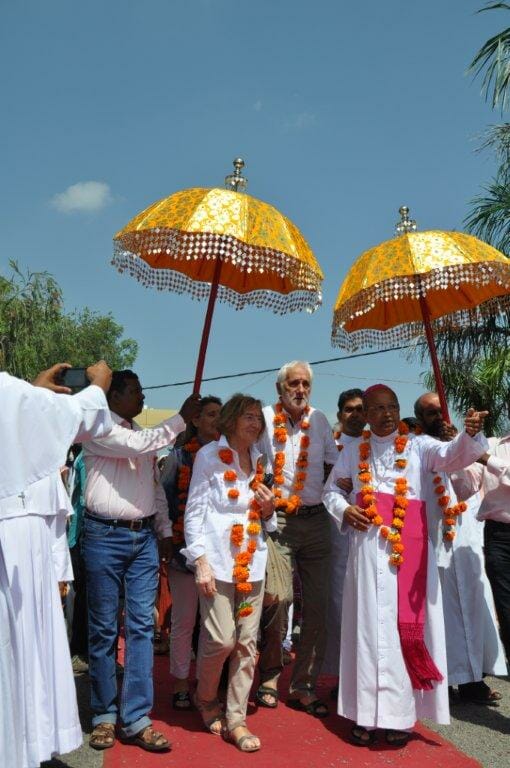 Chiara Badano, named Chiara “Luce” by Chiara Lubich, founder of the Movement (or Work of Mary), was a young Italian, who died at the age of 18 from aggressive bone cancer. She was beatified on 25 September 2010 by Pope Benedict XVI, who acknowledged her heroic virtues and tireless work for the poor, despite the pain of the disease from which she suffered. The Sironi church was dedicated to the Blessed at the express will of Msgr. Chirayath, who learned of the life of Chiara Luce during one of his trips in Italy. Keeping in mind the large youth population that resides in the Indian town and who attend the prestigious English schools in the district, Bishop Sagar sensed that Chiara’s life could serve as an “example and inspiration for students.” The celebrations were attended by Maria Teresa and Ruggero, the parents of the young Blessed, accompanied by her best friend Chicca Coriasco and her brother Franz Coriasco, who wrote Chiara Luce’s biography. Approximately 1,000 participants attended, including priests, religious, seminarians, teachers, high school students and young Focolare members, who organised performances to celebrate the event.
Chiara Badano, named Chiara “Luce” by Chiara Lubich, founder of the Movement (or Work of Mary), was a young Italian, who died at the age of 18 from aggressive bone cancer. She was beatified on 25 September 2010 by Pope Benedict XVI, who acknowledged her heroic virtues and tireless work for the poor, despite the pain of the disease from which she suffered. The Sironi church was dedicated to the Blessed at the express will of Msgr. Chirayath, who learned of the life of Chiara Luce during one of his trips in Italy. Keeping in mind the large youth population that resides in the Indian town and who attend the prestigious English schools in the district, Bishop Sagar sensed that Chiara’s life could serve as an “example and inspiration for students.” The celebrations were attended by Maria Teresa and Ruggero, the parents of the young Blessed, accompanied by her best friend Chicca Coriasco and her brother Franz Coriasco, who wrote Chiara Luce’s biography. Approximately 1,000 participants attended, including priests, religious, seminarians, teachers, high school students and young Focolare members, who organised performances to celebrate the event. 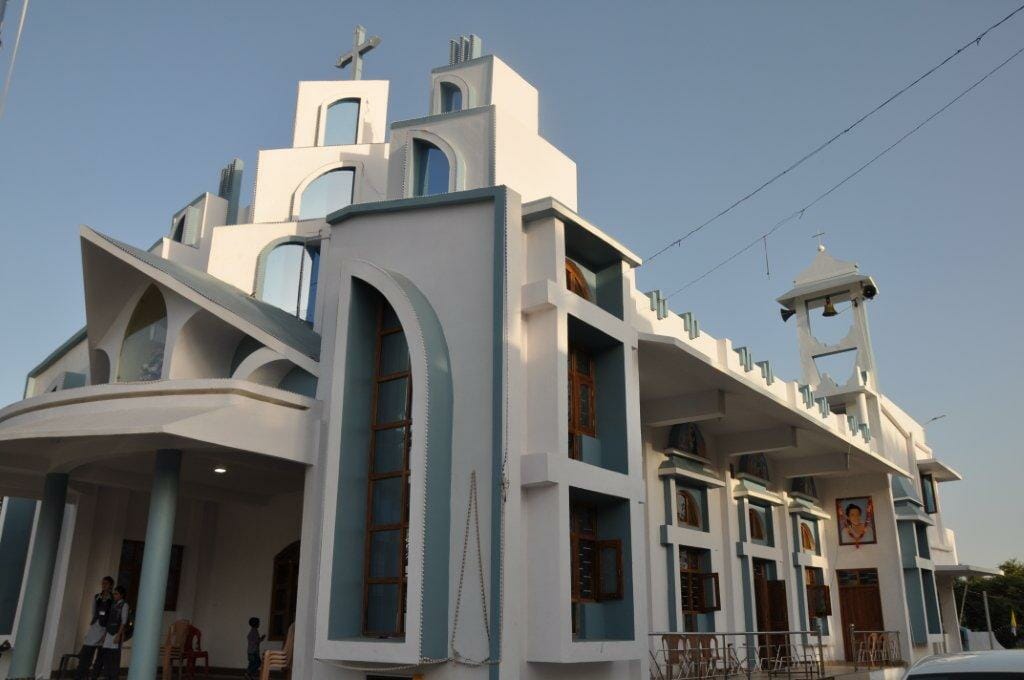 After the inauguration of the church, the parents and friends of Chiara Luce met some members of the Focolare Movement in Mumbai, eager to express their gratitude for the “witness of love and unity”. Also in Mumbai they had a meeting with “Jesusfriends4u”, a youth group inspired by the example of the life of the girl, who awarded the Badano’s the first prize dedicated to their daughter, the Effective Parenting Award. Source: Asia News
After the inauguration of the church, the parents and friends of Chiara Luce met some members of the Focolare Movement in Mumbai, eager to express their gratitude for the “witness of love and unity”. Also in Mumbai they had a meeting with “Jesusfriends4u”, a youth group inspired by the example of the life of the girl, who awarded the Badano’s the first prize dedicated to their daughter, the Effective Parenting Award. Source: Asia News
Oct 7, 2015 | Non categorizzato
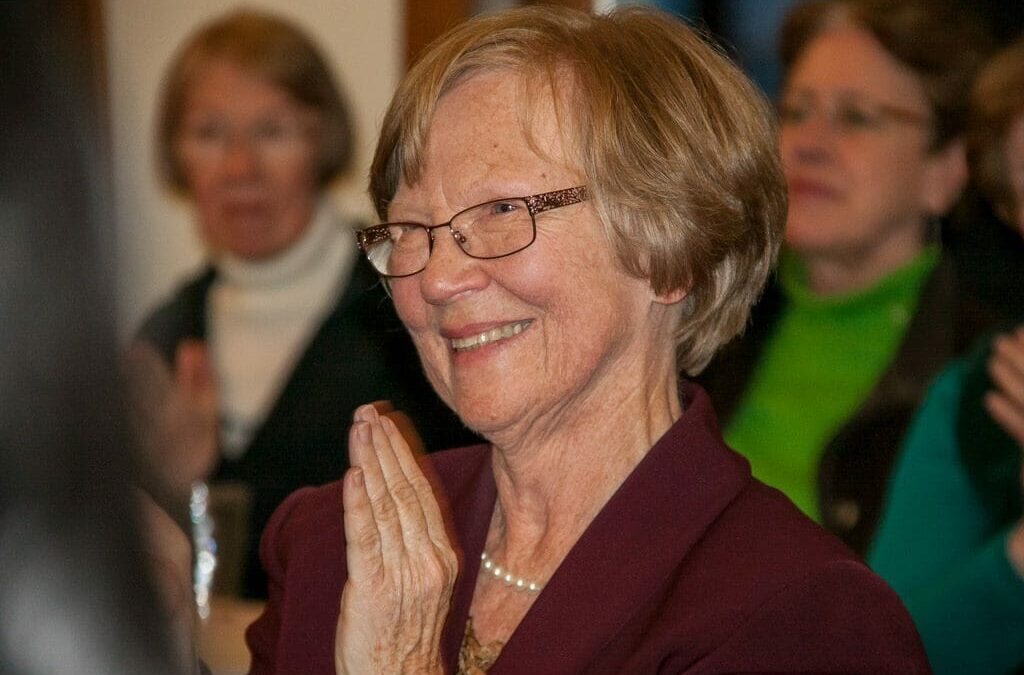
Oct 6, 2015 | Non categorizzato
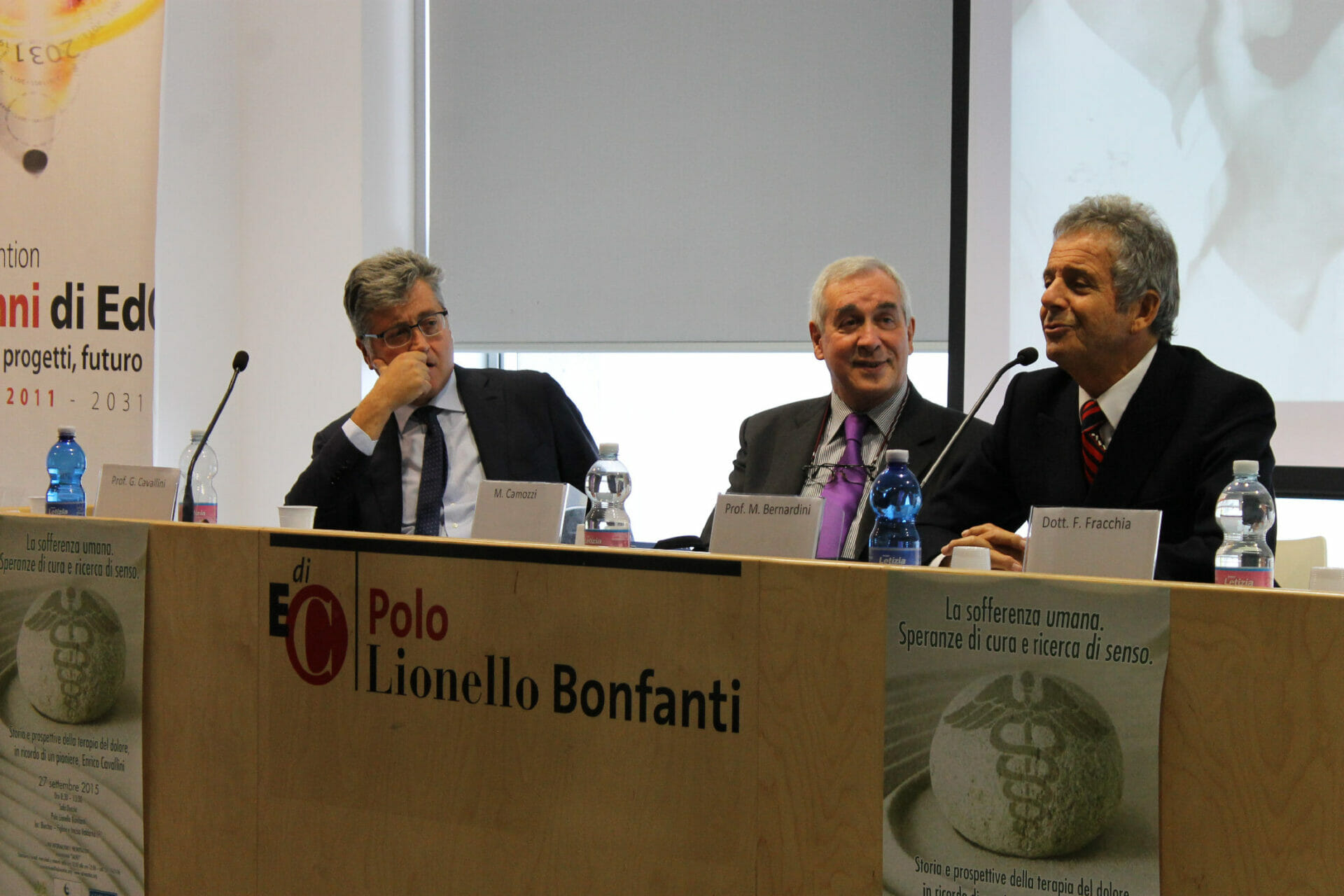 Nancy O’Donnell has worked as a psychotherapist with drug addicts and was once in charge of a medical centre that helps alcoholic women and their children. The issue of the meaning of suffering is central to the lives of people especially during their illness. We would like to ask if it is possible to face the problem of illness and find hope. “Suffering is part of every human life and it would be very difficult to help those who suffer if we ourselves have not found meaning in our own suffering. The path towards hope lies in this effort. Science offers new treatments and new therapies to improve the lives of many. The danger is when we let ourselves be fooled, believing that we will find a way not to get old, sick or suffer. If we seek only the hope of healing, we run the risk of deceiving ourselves, and this may lead to desperation which is the opposite of hope.” What is the role of psychology in the experience of the sick people, and in helping them to find hope? “We could summarise it in four points: the role of the personality and the possibility to change it, the importance of healthy relationships in facing disease, the need to know and accept one’s own limits, and the human capacity to be a gift to others. Personality: being optimistic or having a positive attitude may reduce the risk of illnesses and chronic disorders. At the Davis University in California, they discovered that writing down each day the things you are grateful for helped to increase happiness. The results were more significant when compared with a group that was asked to note down instead, only the things that had provoked greater stress.
Nancy O’Donnell has worked as a psychotherapist with drug addicts and was once in charge of a medical centre that helps alcoholic women and their children. The issue of the meaning of suffering is central to the lives of people especially during their illness. We would like to ask if it is possible to face the problem of illness and find hope. “Suffering is part of every human life and it would be very difficult to help those who suffer if we ourselves have not found meaning in our own suffering. The path towards hope lies in this effort. Science offers new treatments and new therapies to improve the lives of many. The danger is when we let ourselves be fooled, believing that we will find a way not to get old, sick or suffer. If we seek only the hope of healing, we run the risk of deceiving ourselves, and this may lead to desperation which is the opposite of hope.” What is the role of psychology in the experience of the sick people, and in helping them to find hope? “We could summarise it in four points: the role of the personality and the possibility to change it, the importance of healthy relationships in facing disease, the need to know and accept one’s own limits, and the human capacity to be a gift to others. Personality: being optimistic or having a positive attitude may reduce the risk of illnesses and chronic disorders. At the Davis University in California, they discovered that writing down each day the things you are grateful for helped to increase happiness. The results were more significant when compared with a group that was asked to note down instead, only the things that had provoked greater stress. 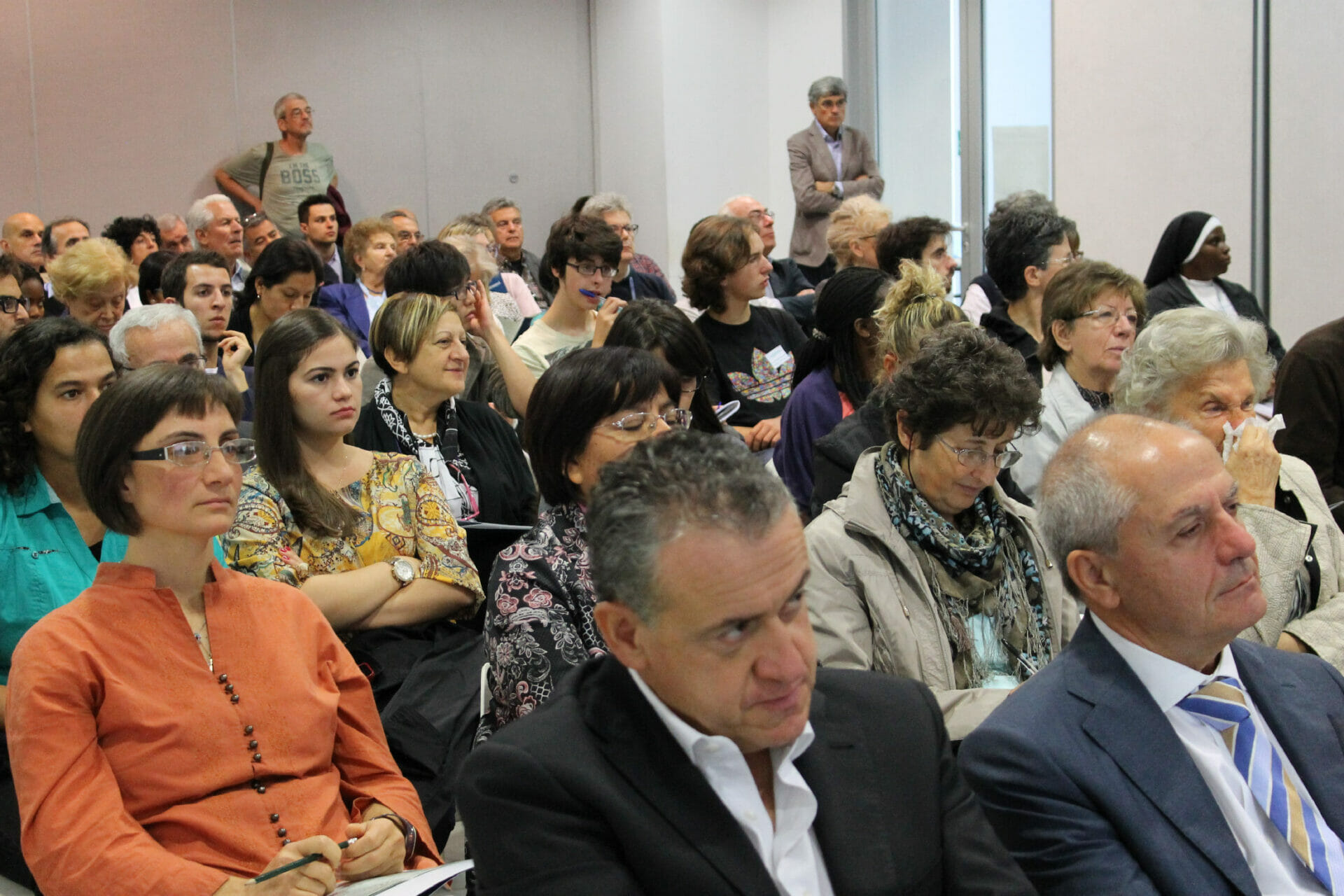 The second point: relationships. From the moment we are born, we have the capacity to establish relationships. The mental health of every person depends on his capacity to “coordinate” himself and “tune in” with others. The human mind is healthy when it possesses some strategic relational skills that allow it to “open up” to a multitude of social realities, that is, with the ability to “perceive” the others and their diversity in an adequate manner. If our identity is relational, it would be logical in moments when nurturing hope becomes a challenge to find the support of people close to us and with whom we have built deep relationships which strengthen the positive energy we need to remain hopeful. Furthermore, not accepting one’s own limits is one of the most typical difficulties people have today. The limit appears through the person’s condition and his/her story, through those experiences that imply the risk of frustration. In a world that offers us a life “without limits,” the onset of illness takes on numerous expressions of that limitation which becomes a decisive transition towards achieving one’s own fulfillment. Lastly, being a gift for the others even when your physical strength is greatly reduced makes a person play an active role always. This is where you acquire a dignity that is born in the depths of our being.”
The second point: relationships. From the moment we are born, we have the capacity to establish relationships. The mental health of every person depends on his capacity to “coordinate” himself and “tune in” with others. The human mind is healthy when it possesses some strategic relational skills that allow it to “open up” to a multitude of social realities, that is, with the ability to “perceive” the others and their diversity in an adequate manner. If our identity is relational, it would be logical in moments when nurturing hope becomes a challenge to find the support of people close to us and with whom we have built deep relationships which strengthen the positive energy we need to remain hopeful. Furthermore, not accepting one’s own limits is one of the most typical difficulties people have today. The limit appears through the person’s condition and his/her story, through those experiences that imply the risk of frustration. In a world that offers us a life “without limits,” the onset of illness takes on numerous expressions of that limitation which becomes a decisive transition towards achieving one’s own fulfillment. Lastly, being a gift for the others even when your physical strength is greatly reduced makes a person play an active role always. This is where you acquire a dignity that is born in the depths of our being.”
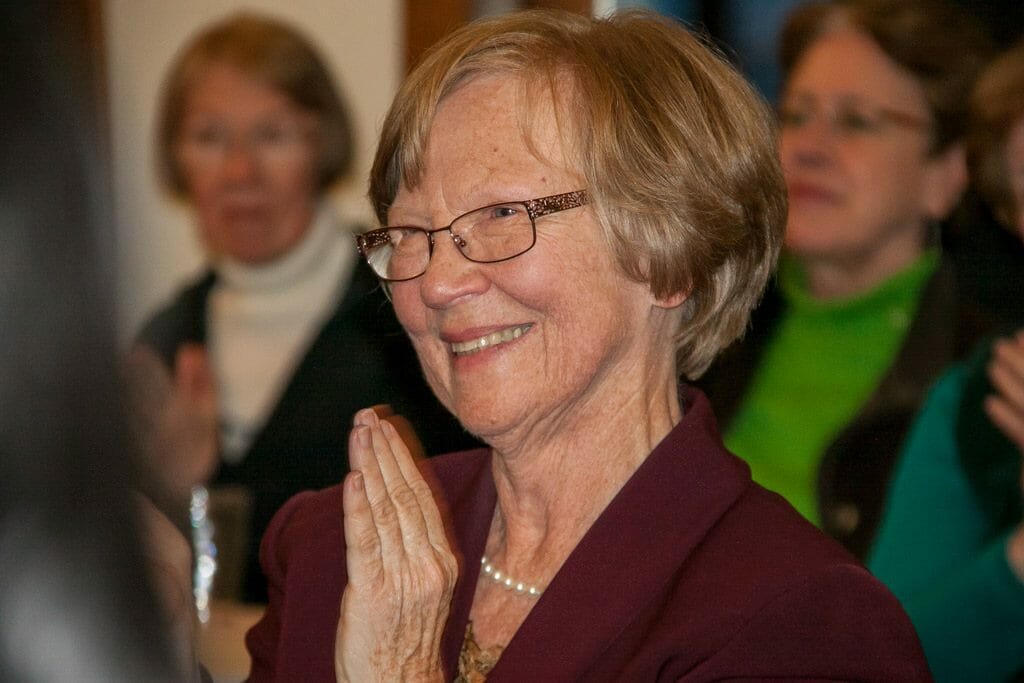
Dr Nancy O’Connell

 «During these years I think I alone visited 50,000 patients,» says Dr. A. Carlo Montaguti, a focolarino doctor and Director of the Social Medical Centre of the little Focolare town in Man, Ivory Coast. «I was a doctor in my country, Italy, but my practice was not so intense. Those who preceded me when there was still the war, told me before my departure: Carlo, if you don’t treat them, no one else will.» The patients arrived also in the night. The health records were compiled in the apatam (shed) in front of the hospital, and then they entered for the medical checkup by any of the three doctors of the centre, one of which is Muslim. The doctors prescribed the lab tests and got the results in about two hours. In a second visit, the diagnosis was done and the treatment prescribed. In the span of a morning one manages to get everything done. «It is not usual to have a lab for analysis in such a small centre in the suburbs,» Carlo continues; «I worked for four years without a lab and it was really difficult.» Luc Dro, head of the laboratory, explained that being in a tropical zone, there is great need for studies on parasites that cause malaria and other endemic diseases, but the lab is able to perform a complete check-up. The centre also has a small pharmacy, where over a 100,000 consultations were registered. «We do all that is possible to put the patients at the core of our work – says Dr. Alavo Bazini – and this explains the great influx. It does not suffice to say “the medicines are free of charge,” if the people are not satisfied. This is where the centre’s originality lies.» When possible, there is also a cultural mediator who translates into the local tongues. «We also have the internet and wi-fi connection – explained Dr. Eliassa Sow – In this way we can do research work and cooperate with other doctors from afar.» Dr. Montaguti continues «I came in 2004 – when the centre consisted of two tiny rooms for visits and one for medications. The people have appreciated our work especially because during the war in 2002, in the most difficult moments when all the foreigners were leaving the country, we decided to stay on, and risk our lives. They understood that we were there for them and this generated their trust. At times it came about that on a Monday, after the weekend break, the patients said: ”Doctor, I tried to endure in order to come to you.” If their situation was not too serious, they preferred to wait another day and suffer a bit more, to be able to come here!» One of the strong points of the centre is also the healthcare team which is involved in the entire care process. When the political-military crisis ended and the situation in the region calmed down, the term of the centre was extended and in 2008 we moved into a new facility. «It seemed like a dream – Carlo recalls – but after two years with the influx of patients – more than 80 a day plus their relatives – quite a crowd! – the old structure could not take any more. And we continued to dream.» And so last 10 October, the new Focolare Social Medical Centre, opened last 7 September, was inaugurated in Man, a stone’s throw from Mariapolis Victoria. It is a modern architecture for a facility of over 1,000 sq. m, with the addition of new services: 15 beds, a dentist’s studio, a physiotherapy room, and new diagnostics equipment (ultrasound scans, hemoglobin electrophoresis and microbiology). In the last days the nutrition centre, previously located in the district of Libreville, was completed and transferred to cure infantile malnutrition..
«During these years I think I alone visited 50,000 patients,» says Dr. A. Carlo Montaguti, a focolarino doctor and Director of the Social Medical Centre of the little Focolare town in Man, Ivory Coast. «I was a doctor in my country, Italy, but my practice was not so intense. Those who preceded me when there was still the war, told me before my departure: Carlo, if you don’t treat them, no one else will.» The patients arrived also in the night. The health records were compiled in the apatam (shed) in front of the hospital, and then they entered for the medical checkup by any of the three doctors of the centre, one of which is Muslim. The doctors prescribed the lab tests and got the results in about two hours. In a second visit, the diagnosis was done and the treatment prescribed. In the span of a morning one manages to get everything done. «It is not usual to have a lab for analysis in such a small centre in the suburbs,» Carlo continues; «I worked for four years without a lab and it was really difficult.» Luc Dro, head of the laboratory, explained that being in a tropical zone, there is great need for studies on parasites that cause malaria and other endemic diseases, but the lab is able to perform a complete check-up. The centre also has a small pharmacy, where over a 100,000 consultations were registered. «We do all that is possible to put the patients at the core of our work – says Dr. Alavo Bazini – and this explains the great influx. It does not suffice to say “the medicines are free of charge,” if the people are not satisfied. This is where the centre’s originality lies.» When possible, there is also a cultural mediator who translates into the local tongues. «We also have the internet and wi-fi connection – explained Dr. Eliassa Sow – In this way we can do research work and cooperate with other doctors from afar.» Dr. Montaguti continues «I came in 2004 – when the centre consisted of two tiny rooms for visits and one for medications. The people have appreciated our work especially because during the war in 2002, in the most difficult moments when all the foreigners were leaving the country, we decided to stay on, and risk our lives. They understood that we were there for them and this generated their trust. At times it came about that on a Monday, after the weekend break, the patients said: ”Doctor, I tried to endure in order to come to you.” If their situation was not too serious, they preferred to wait another day and suffer a bit more, to be able to come here!» One of the strong points of the centre is also the healthcare team which is involved in the entire care process. When the political-military crisis ended and the situation in the region calmed down, the term of the centre was extended and in 2008 we moved into a new facility. «It seemed like a dream – Carlo recalls – but after two years with the influx of patients – more than 80 a day plus their relatives – quite a crowd! – the old structure could not take any more. And we continued to dream.» And so last 10 October, the new Focolare Social Medical Centre, opened last 7 September, was inaugurated in Man, a stone’s throw from Mariapolis Victoria. It is a modern architecture for a facility of over 1,000 sq. m, with the addition of new services: 15 beds, a dentist’s studio, a physiotherapy room, and new diagnostics equipment (ultrasound scans, hemoglobin electrophoresis and microbiology). In the last days the nutrition centre, previously located in the district of Libreville, was completed and transferred to cure infantile malnutrition.. 














